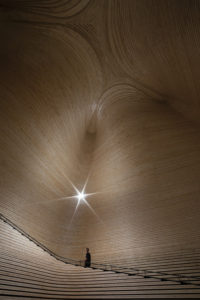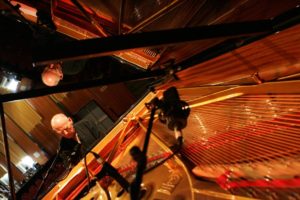Imagine Sydney’s best ever jazz festival at an obscure venue that’s so hip you can’t even buy a ticket. That’s exactly what’s happening when the four-night STRATA festival descends into the nest-like cavity of Phoenix Central Park, surely the most beautiful music venue Sydney’s ever had.

Phoenix was the brainchild of Judith Nielson, the noted arts philanthropist. Her daughter Beau, the venue’s boss, says the intensity generated by the standing audience’s proximity to the performers at London’s Globe Theatre influenced her mother’s thinking. But Phoenix then flew its own course, being a small-capacity music venue of jaw-dropping architecture (by Durbach Block Jaggers Architects with John Wardle Architects) and perfect acoustics, with free tickets to attract and unite a cross-section of the community.
The slightly forbidding street-frontage opens on to a blaze of natural light and an internal garden, before you enter the performance space one floor up from the playing area. Audience members can watch and listen from there, or descend a gracious staircase to the main floor. Immediately striking is the swirling, stratified ceiling, made up of countless wooden slats slotting into each other like a gigantic jigsaw puzzle. The walls are also timbered, while the floor is concrete, and Beau Neilson aptly describes the acoustics as having “a soft resonance”.
Having weathered the pandemic just after opening, Phoenix now comes fully to life, built on the site of a martial arts studio that burned down – hence the name. With limited seating, most people stand – happily, given each show’s duration is around 45 minutes. Special needs are also accommodated, the staff being as obliging as waiters at some classy restaurant where the food is music.

Tickets are given away via a ballot on the venue’s website. Hundreds or even thousands of people might enter the ballot for a given concert, from which around 120 winners are randomly selected, the idea being to extend the experience to as many people as possible.
Beau Nielson and her team pursue a diversity of styles (from classical to hip hop), instrumentation and performers. “We need different perspectives, different voices, different ages and people at different stages of their career,” Nielson says. She also wants distinctive acts: “It’s finding one where you think, ‘Oh, gosh, that’s different. I wouldn’t have thought of seeking that out.’ Or maybe they’re doing something I’m familiar with, but in a different way, and being brave with their creative choices.”
Nielson books acts directly and also engages specialist curators, as she’s done with drummer/composer Laurence Pike for STRATA, who pitched the festival idea after performing at Phoenix and being smitten by the sound and architecture. “It feels almost like the Utopian idea of an art space,” he says. “By Sydney standards, especially, it feels like the sort of space you would come across in Europe.”

Pike has expertly curated each night with a combination of younger bands, more established ones and genuine headliners in the guise of Triosk, the Phil Slater Quintet and pianists Mike Nock and Barney McAll. At Pike’s suggestion, Nock is performing – for the first time ever – his most lyrical and emotive album, 1981’s Ondas. Pike had previously shied from proposing the idea to his sometime collaborator, partly because he assumed Nock would say no, given his constant laser focus on current projects. In the event the pianist enthusiastically agreed on condition that Pike play drums, the pair joined by exceptional young bassist Jacques Emery.
The other coup is the reunion of the internationally acclaimed Triosk after it splintered less than amicably 15 years ago. Consisting of Pike, keyboards player Adrian Lim-Klumpes and bassist Ben Waples, the trio’s troubles were never musical. “It was more just a personal breakdown,” says Pike. “We were in our mid-to-late 20s, and just trying to work out who we were as people. We’d started playing together from a very young age, we’d made three albums, and before we knew it we were doing these international tours.”
When COVID halted their solo various projects, Waples suggested a reunion. “For whatever reason it suddenly felt like the timing was right,” says Pike. “Initially we got together and it was almost like a bit of group therapy, just for everyone to say their piece and put the ghosts to rest.” Then they tried playing, and knew the music was a good as ever.
STRATA, Phoenix Central Park, March 31-April 3.